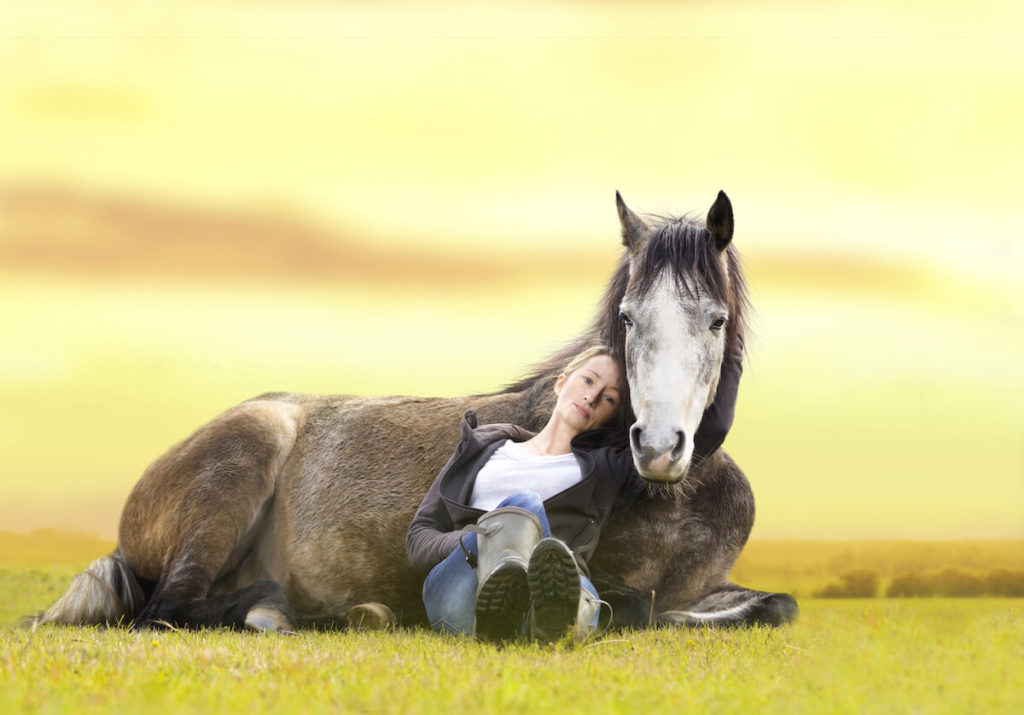
What if you changed the pace for a while and stepped out of your usual routine? You might just start to see and feel magical things happening for both your horse’s mental health and your own!
Spending time with horses offers numerous wellness benefits. And the good news is, you don’t have to be skilled in an equestrian discipline or participate in an equine-assisted program to feel the wonderful effects! In fact, if you’re a horse owner, not only can you take advantage of what your horse can do for you, but you can also help improve your horse’s mental health at the same time. Two happy hearts make for two happy minds – plus, it’s easier than you think!
In order for both humans and horses to mutually benefit from what each party has to offer, it is ideal to have a well-established relationship. But building a truly authentic connection founded in equality, respect, and trust takes time and requires a specific focus. By the very nature of our busy lives, our time at the barn is often rushed. We tend to favor performance-based activities versus those that are rooted in relationship building.
Try these simple, mutually beneficial activities, and you’ll begin to notice improved self-confidence, a greater ability to self-regulate, and an ability to relieve stress as a team.
1) Improve self-confidence
Activity: Go for a bareback ride outside. Use a gentle bit, a bitless bridle, or a simple halter with reigns. Try to keep your ride to 15 minutes or less.
Why this works for you: This activity helps build a sense of influence and control over one’s future and arising challenges, which is an important mental health protective factor.
All horses are unpredictable to a certain degree, and all riders accept this truth. It takes a bit more courage to ride bareback and with less bit of control, as the rider is left without the security and increased sense of stability that comes with a saddle and stir-ups.
Life is unpredictable as well. Some of us are better than others at accepting this and rolling with the punches. Riding bareback gives us direct practice in gathering our courage, taking risks, and learning to feel safe when outcomes are unknown. This has a great empowering impact on our day-to-day life and overall wellness.
Why this works for your horse: This activity works for your horse on many levels.
Being in close contact with your horse provides him with direct and simple proprioceptive feedback without any potential discomfort caused by a saddle. Some studies have suggested that horses can begin to experience some symptoms of discomfort, regardless of saddle fit, within 15 minutes.
Unlike other nervous system senses (which go to a processing center of the brain to be analyzed), proprioceptive pathways (which are stimulated through deep pressure to the joints) go directly to the cortex and cause a calming and organizing effect. If you keep your walk short, proprioceptive input can be calming for a horse that has a relationship with you. Having a calming effect on a horse increases his confidence in your presence.
The same concept applies to the gentle use of reigns.
Editor’s note: Bareback riding is not ideal for inexperienced riders or untrained horses. Be sure you trust your own abilities and those of your equine companion before attempting this activity.
2) Learn to self-regulate
Activity: Let your horse lead you on a ride (instead of the other way around)! Take your horse on the grounds of your boarding facility or your home property. While respecting the safety principles of riding and intervening when necessary, let your horse explore as she would alone. The difference is that instead of being the person giving directions for your horse to follow, you are like a little bird perched on your horse’s back, along for the ride!
Why this works for you: This activity helps increase your awareness around the bio-feedback symptoms of your nervous system so you can learn to control your stress responses as soon as you recognize them emerging.
Besides being fun, this activity teaches you to micro-manage your most subtle reactions to your horse’s unpredictable decisions. At times, your ride might feel peaceful or exciting, and at other times, a little uncertain or nerve-wracking. As most equestrians know, since horses are prey animals, they are experts at picking up on all our emotional states and will mirror them right back at us.
That said, this activity also forces you to be consciously aware of every feeling you experience to keep yourself in check so your horse can feel safe. This is referred to as self-regulation. Nothing teaches this essential coping strategy as well as a horse!
Why this works for your horse: Prey animals instinctually operate in a state of fight or flight when they pick up on stress or a perceived threat. By learning to control your own responses to mood changes and stress, you allow your horse to process what is happening on a conscious level, eliminating the need for the nervous system to kick into a protective mode of fight or flight.
3) Relieve Stress
Activity: Spend shared leisure time with your horse without any expectations. Enjoy reading by your horse’s side or having your tea/coffee in his presence. You can even try inviting him to be around a campfire or keep you company during gardening tasks.
Why this works for you: Simply being in the presence of horses has been shown to have a calming and reassuring effect on humans and is a great activity to add as a resource for coping. It’s also a great way to develop hardiness, which is a protective factor relating to how people process and cope with stressful events.
Breaks are healthy and necessary for any living soul’s well-being. Giving ourselves permission to un-schedule our lives during stressful times is essential to relieving the pressure to perform and achieve when the focus should be tending to our mental health needs.
Why this works for your horse: Making an effort to show your horse that your love and acceptance is not dependent on the quality of performance or obedience is essential for reaching new levels of friendship. When your horse experiences a state of relaxation in your presence, this creates a positive emotional memory and is stored in the amygdala of your horse’s brain. Your horse is then more apt to associate you with feelings of comfort on a neurophysiological level.
Spending quality time with your horse, free from restraint or expectation, can work wonders for your relationship with each other – and your relationship with yourself. Make these activities a priority, and you will both reap the benefits.

